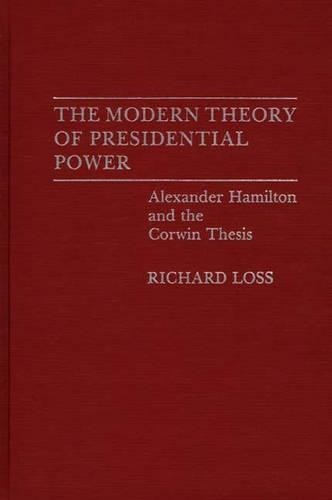
The Modern Theory of Presidential Power: Alexander Hamilton and the Corwin Thesis
(Hardback)
Publishing Details
The Modern Theory of Presidential Power: Alexander Hamilton and the Corwin Thesis
By (Author) Richard Loss
Bloomsbury Publishing PLC
Praeger Publishers Inc
27th June 1990
United States
Classifications
Tertiary Education
Non Fiction
353.0322
Physical Properties
Hardback
192
Width 156mm, Height 235mm
510g
Description
This book takes a critical look at Edward S. Corwin's Hamilton thesis, which names Alexander Hamilton as the primary contributor to the modern theory of presidential power. It examines the theoretical and practical articulation of the presidency by Hamilton and George Washington, the development of the modern theory through the administrations of Lincoln, Theodore Roosevelt, Wilson, and FDR, and the theories of other presidential scholars. An epilogue discusses the direction of the presidency after Ronald Reagan. This is an important book for students of the American Presidency. It should also be read by anyone interested in American political thought . . . . Dr. Loss marshalls an impressive amount of erudition in support of his position. Francis H. Heller, University of Kansas Richard Loss attempts to appraise Edward S. Corwin's thesis that Alexander Hamilton was the primary contributor to the modern theory of presidential power. Suggesting that the teachings of Hamilton and George Washington set the tone for the American presidency, the author explains the differences between these teachings and the interpretations of the modern presidents who aggrandized the power of the office. The book assesses the works of scholars who added to the modern theory of presidential power, Edward S. Corwin, Clinton Rossiter, and Richard E. Neustadt. The book has two main sections. The first part shows how Hamilton and Washington understood the moral ends of the American political community and the constitutional means of presidential power. The second part studies the discarding of Hamilton's teachings by four statesmen who helped shape the modern theory of presidential power: Abraham Lincoln, Theodore Roosevelt, Woodrow Wilson, and Franklin D. Roosevelt, and by scholars who molded public expectations of the presidency. An epilogue discusses the possible direction of the presidency by examining Ronald Reagan's understanding of the office. Loss concludes that Corwin's Hamilton thesis is more persuasive as an admonition to revive sound constitutional theory than as an historical account of the relation between Hamilton's teachings and modernity. Corwin's mature reflections imply that a return to moderation in stating what the Constitution permits in presidential power and discretion is an important task for constitutional scholarship today. This study will be an important supplement for courses in American government, the American presidency, and public law, as well as a valuable addition to both public and academic libraries.
Reviews
"By returning to the original principles established by George Washington and Alexander Hamilton, Richard Loss challenges us to rethink the steps that must be taken to make the American President an effective institution for contemporary times."-Louis Fisher Senior Specialist, Separation of Powers Government Division, The Library of Congress
"This is an important book for students of the American Presidency. It should also be read by anyone interested in American political thought. . . . Dr. Loss marshalls an impressive amount of erudition in support of his position."-Francis H. Heller Professor Emeritus School of Law, The University of Kansas
Loss presents a thorough analysis of what he calls the modern theory of presidential power. Grounding his work in Edward Corwin's understanding of the presidency, Loss focuses on the 'relationship of the teachings of Alexander Hamilton to the modern theory of presidential power.' The author concludes by arguing that Hamilton stressed both responsibility and energy, while modern theorists are interested exclusively in presidential power. Loss provides a thorough, well-written analysis of the subject, but neither the style nor the subject matter is accessible to the average undergraduate. This volume will be a solid addition to the libraries that have good collections in the philosophy of American government, ppolitical institutions and institutional history, philosophy, and political science. A valuable book for graduate students and scholars interested in a theoretical understanding of presidential power.-Choice
"Loss presents a thorough analysis of what he calls the modern theory of presidential power. Grounding his work in Edward Corwin's understanding of the presidency, Loss focuses on the 'relationship of the teachings of Alexander Hamilton to the modern theory of presidential power.' The author concludes by arguing that Hamilton stressed both responsibility and energy, while modern theorists are interested exclusively in presidential power. Loss provides a thorough, well-written analysis of the subject, but neither the style nor the subject matter is accessible to the average undergraduate. This volume will be a solid addition to the libraries that have good collections in the philosophy of American government, ppolitical institutions and institutional history, philosophy, and political science. A valuable book for graduate students and scholars interested in a theoretical understanding of presidential power."-Choice
Author Bio
RICHARD LOSS is an independent political scientist. He has edited and written introductions to Corwin on the Constitution, Vols. I-III, Presidential Power and the Constitution: Essays by Edward S. Corwin, Alexander Hamilton and James Madison's Letters of Pacificus and Helvidius with the Letters of Americanus, and Friedrich von Gentz's The Origin and Principles of the American Revolution Compared with the Origin and Principles of the French Revolution.
